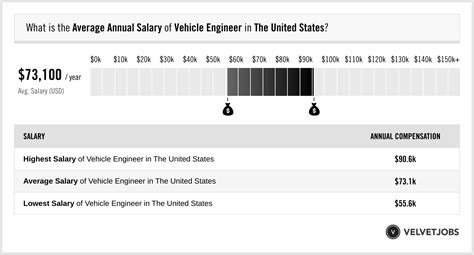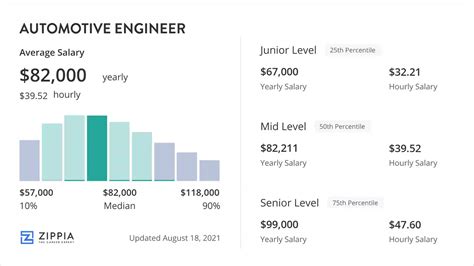The automotive industry is in the midst of a technological revolution. From the surge of electric vehicles (EVs) to the rapid advancements in autonomous driving, the demand for skilled and innovative engineers has never been higher. If you have a passion for vehicles and a mind for problem-solving, a career as a car engineer is not only intellectually stimulating but also financially rewarding.
So, what can you expect to earn? While salaries can vary widely, a car engineer in the United States can anticipate a starting salary in the range of $70,000, with the potential to earn well over $130,000 with experience and specialization. This article will break down the salary you can expect and the key factors that will drive your earning potential throughout your career.
What Does a Car Engineer Do?

A "car engineer," more formally known as an automotive engineer, is a specialized type of mechanical engineer who is involved in nearly every stage of a vehicle's life. They are the architects of modern mobility. Their responsibilities are vast and can include:
- Design and Development: Conceptualizing and designing new vehicles and their components, from engines and transmissions to chassis and infotainment systems.
- Testing and Validation: Conducting rigorous tests on prototypes and parts to ensure they meet safety, performance, and durability standards.
- Manufacturing and Production: Developing and overseeing the processes that build vehicles efficiently and to a high standard of quality.
- Research and Innovation: Pushing the boundaries of technology by researching new materials, alternative fuels (like electricity and hydrogen), and advanced driver-assistance systems (ADAS).
Essentially, if a part of a car moves, uses energy, or keeps you safe, a team of engineers was behind it.
Average Car Engineer Salary

When analyzing salary data, it's important to look at multiple sources to get a complete picture. Generally, the compensation for a car engineer is strong and grows significantly with experience.
According to data from several authoritative sources:
- The U.S. Bureau of Labor Statistics (BLS) reports that the median annual wage for mechanical engineers (the broader category under which most automotive engineers fall) was $96,310 as of May 2022. The lowest 10 percent earned less than $62,590, while the top 10 percent earned more than $151,260.
- Salary.com places the median salary for a mid-level Automotive Engineer in the U.S. at around $95,570 as of late 2023, with a typical range falling between $87,500 and $104,700.
- Payscale reports a slightly lower average base salary of around $86,000, with a common range of $65,000 to $125,000 depending heavily on experience and other factors.
Takeaway: A realistic expectation for a car engineer's salary is to start in the $65,000 to $80,000 range, progress to a median salary around $95,000, and, as a senior or specialist, command a salary of $125,000 or more.
Key Factors That Influence Salary

Your specific salary is not a single number but a reflection of several key variables. Understanding these factors is crucial to maximizing your earning potential.
### Level of Education
A Bachelor of Science in Mechanical Engineering is the standard entry requirement for most automotive engineering roles. However, advanced education can significantly boost your starting salary and career trajectory. A Master of Science (M.S.) or Doctor of Philosophy (Ph.D.) can open doors to specialized, high-paying roles in areas like research and development (R&D), advanced simulation, or specific fields like battery chemistry or artificial intelligence for autonomous systems. Employers often pay a premium for this deep-level expertise.
### Years of Experience
Experience is arguably the single most significant factor in salary growth. A typical career progression might look like this:
- Entry-Level (0-3 years): Engineers focus on learning, executing specific tasks under supervision, and gaining foundational skills. Salaries typically range from $65,000 to $80,000.
- Mid-Career (4-9 years): Engineers take on more responsibility, lead smaller projects, and develop specialized knowledge. This is often when salaries cross the $100,000 threshold.
- Senior / Lead Engineer (10+ years): With extensive experience, these professionals manage large-scale projects, mentor junior engineers, and influence technical strategy. Their salaries often range from $120,000 to $150,000+.
### Geographic Location
Where you work matters. States and cities with a high concentration of automotive manufacturers (OEMs), suppliers, and tech hubs offer more competitive salaries, though this is often balanced by a higher cost of living.
- Michigan (Detroit Metro Area): As the traditional heart of the U.S. auto industry, it remains a hub for engineering talent with competitive salaries.
- California: A hotspot for EV companies like Tesla and Rivian, as well as R&D centers for global automakers and tech companies working on autonomous driving. It offers some of the highest salaries in the nation.
- Ohio, South Carolina, and Texas: These states have a major presence of foreign and domestic auto manufacturing plants and offer strong engineering salaries.
According to the BLS, the top-paying states for mechanical engineers include California, Maryland, Texas, and Washington, all of which have a significant presence of automotive or related aerospace/tech industries.
### Company Type
The type of company you work for will have a major impact on your compensation structure.
- Original Equipment Manufacturers (OEMs): Large, established automakers like Ford, General Motors, and Toyota. They typically offer structured salary bands, excellent benefits, and stability.
- Tier 1 Suppliers: Companies like Bosch, Magna, or Continental that design and build major systems for OEMs. Salaries are very competitive and sometimes match or exceed OEM levels for specialists.
- Tech Companies & EV Startups: Companies like Tesla, Rivian, Waymo, or even Apple are major employers of automotive engineers. They often offer very high base salaries and potentially lucrative stock options to attract top talent, especially in software, battery, and electronics engineering.
- Motorsport: Working for a NASCAR or Formula 1 team is a highly competitive and specialized niche that can be extremely rewarding for top-tier engineers.
### Area of Specialization
In today's automotive landscape, specialization is key. While a powertrain or chassis engineer will always be needed, those with skills in high-growth areas can command a significant salary premium. High-demand specializations include:
- Electric Vehicle (EV) Systems: Engineers specializing in battery design, battery management systems (BMS), and electric motor performance are in extremely high demand.
- Autonomous Driving and ADAS: This is a multidisciplinary field. Engineers with skills in software development, sensor fusion, robotics, computer vision, and AI/machine learning are among the highest-paid in the industry.
- Software and Connectivity: Modern cars are computers on wheels. Engineers who can develop in-vehicle infotainment (IVI), over-the-air (OTA) update systems, and vehicle-to-everything (V2X) communication are critical.
- Computer-Aided Engineering (CAE): Experts in simulation software for Finite Element Analysis (FEA) or Computational Fluid Dynamics (CFD) are invaluable for virtual testing, which saves companies millions in development costs.
Job Outlook

The future for car engineers is bright. The BLS projects that employment for mechanical engineers will grow by 10% from 2022 to 2032, which is much faster than the average for all occupations.
This robust growth is driven by the industry's massive transformation. As automakers transition their entire fleets to electric, invest billions in autonomous technology, and strive to create more sustainable and efficient vehicles, they will need a new generation of engineers to lead the way.
Conclusion

A career as a car engineer offers a powerful combination of challenging work, industry impact, and strong financial compensation. While a six-figure salary is well within reach, your earning potential will be directly shaped by your choices.
To maximize your salary, focus on continuous learning, gaining hands-on experience, and aligning your skills with the industry's most pressing needs—particularly in the electric, autonomous, and software domains. By pursuing a path of specialization and excellence, you can build a highly rewarding and lucrative career at the forefront of automotive innovation.
